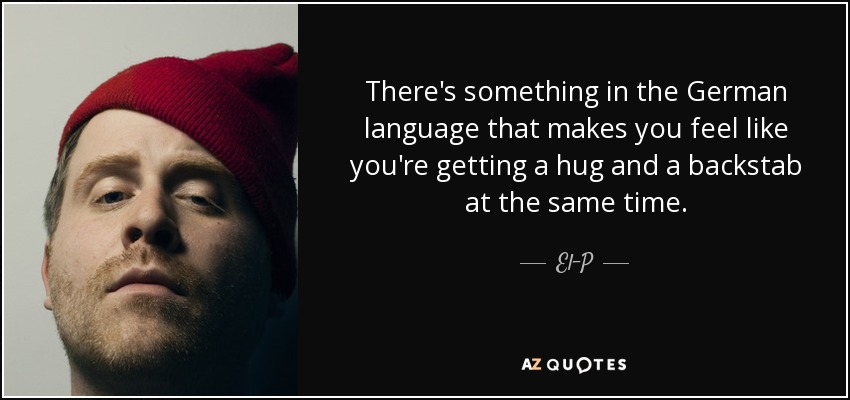
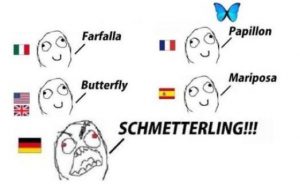 Teach German With An Awesome First German Lesson for Beginners
Teach German With An Awesome First German Lesson for Beginners
I am in love with the German language and I absolutely love teaching first German lessons. However, I can kind of see where the quote is coming from. German can definitely be seen as a harsh language. So, in this post, I’d like to give suggestions on how to present the German language as more of a hug, rather than a stab in the back!
 Enthuse Complete Beginners To Learn German
Enthuse Complete Beginners To Learn German
In the past, when I taught German in secondary schools, the first German lesson for a beginner was fairly standard. We started by eliciting the words that students already knew and then moved onto greetings.
Whilst that’s definitely a useful starting point, it’s not a particularly interesting nor a motivating method to introduce new learners to this fabulous language, in my humble opinion. Instead, in the first German lesson, students should feel enthused and be left with the feeling that it’s not such a feat to learn the language, as well as a thirst to learn more.
In addition, nowadays, some students have a lot more German knowledge, after having studied it at primary school and so a lesson on greetings, to begin, could demotivate students who have already covered this topic.
Therefore, I try to mix things up a bit and my first German lesson for beginners, which is perfect for children, teenagers and adults alike. My format for the very first language session is as follows:
Great First Lesson in German for Complete Beginners
Yes, the German language can sound harsh and yes, it does have some complex grammar rules which are rather different to English and some other modern foreign languages. However, as mentioned earlier, a great first German lesson should enthuse the student to want to learn more and help the student quickly pick up tips and tricks, as well as similarities between German and English to make their language learning journey easier.
So, I go for a first lesson based on cognates, patterns and the basic differences between German and English to make the lesson accessible, fun, but also to show that German isn’t actually that difficult to learn.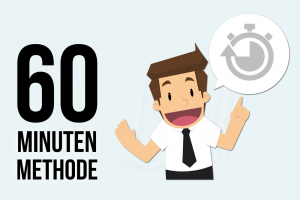 60-minute BASIC German Beginner Lesson Plan
60-minute BASIC German Beginner Lesson Plan
In the 60-minute lesson, we cover a lot (vocabulary, grammar, translation, pronunciation and writing) and this is the basic outline, as well as links to two worksheets and a PPT.
- Instant German Cognates – recognition, translation and production in German
- Spelling patterns between German and English – written practice and spoken practice
- Pronunciation – ‘w’ in German is like a ‘v’ in English, as well as how to pronounce the letter ‘E’ at the end of words
- Basic Grammatical Differences – der/die/das (the)
- Basic verb patterns – ‘en’ at the end of a verb without a subject translates as ‘to’ in German.
- Producing basic German sentences – using Alles Über Mich translation from German to English and vice versa.
 Obviously, you may have to pad this out, using your own spin on things, but this works fabulously in my beginner German lesson and helps to show that German isn’t such a difficult language to learn! My students really do enjoy this lesson and so I have attached the adapted resources that I use in the links above. Since I have been using these resources for so long, I can’t credit the original creator, but if it’s you, let me know!
Obviously, you may have to pad this out, using your own spin on things, but this works fabulously in my beginner German lesson and helps to show that German isn’t such a difficult language to learn! My students really do enjoy this lesson and so I have attached the adapted resources that I use in the links above. Since I have been using these resources for so long, I can’t credit the original creator, but if it’s you, let me know!
What do you teach in your first German lessons?
JOIN ME ON MY SOCIALS FOR MORE FAB TEACHING CONTENT >>
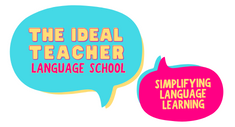
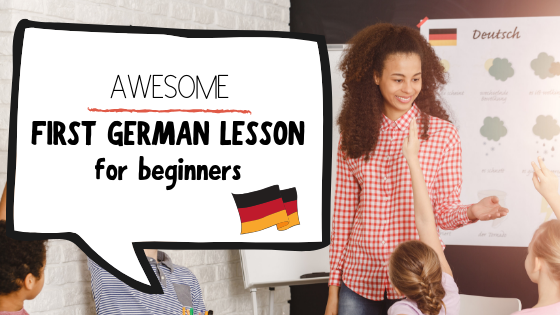
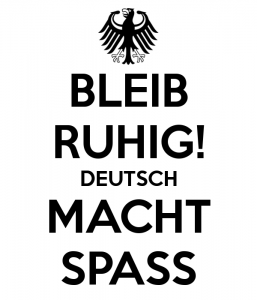
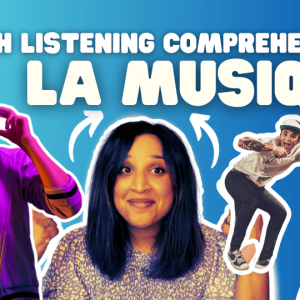
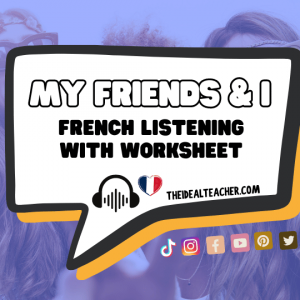
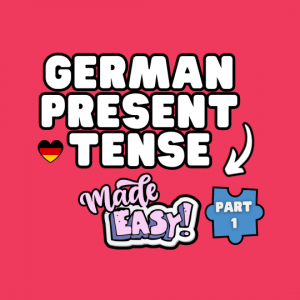

Thanks for this. I am about to start with my first IB German Ab Initio class and will definitely use this!
Thanks for an interesting take on “the first lesson” – I am teaching a standalone taster lesson to primary kids and these resources are perfect for introducing some sounds and structures without treading the usual path of greetings.
I added some compound nouns as an extension/homework activity, and it was good fun 🙂
Lieben Dank!! This has been a brilliant find to ease anxiety about my first lesson.
Thank you for your generous sharing
Vielen Dank! This is really helpful. I am running a taster lesson for Year 8s, and I am adding a match-up activity with some fun compound nouns, and using a bit less of the grammar & pronunciation, but I love the translation exercise. My German is rather rusty so it’s brilliant to have your lovely resources to give me ideas and confidence!
Aww thanks for the lovely feedback. I am glad the resources are helpful 🙂